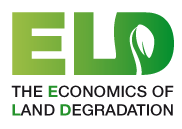A study on ecosystem service trade-offs under four different land use scenarios in Botswana's Kalahari rangelands has found that communal grazing land uses deliver the broadest range of ecosystem services.
However, the study calls for policy reform to prevent an over-emphasis on commercial food production.
The report is part of a series of case study outputs supported by the Economics of Land Degradation (ELD) initiative.
 3 September 2014: A study on ecosystem service trade-offs under four different land use scenarios in Botswana’s Kalahari rangelands has found that communal grazing land uses deliver the broadest range of ecosystem services. However, the study calls for policy reform to prevent an over-emphasis on commercial food production. The report is part of a series of case study outputs supported by the Economics of Land Degradation (ELD) initiative.
3 September 2014: A study on ecosystem service trade-offs under four different land use scenarios in Botswana’s Kalahari rangelands has found that communal grazing land uses deliver the broadest range of ecosystem services. However, the study calls for policy reform to prevent an over-emphasis on commercial food production. The report is part of a series of case study outputs supported by the Economics of Land Degradation (ELD) initiative.
The study, titled ‘A Case Study of Botswana’s Kalahari: Assessing the Socio-Economic and Environmental Dimensions of Land Degradation,’ identifies key rangeland ecosystem service benefits in Southern Botswana’s Kgalagadi District: food; fuel; construction material; ground water; genetic diversity; climate regulation; recreation; and spiritual inspiration. It then ranks different land uses based on the costs and trade-offs associated with ecosystem service delivery under them. Land uses considered are: communal livestock grazing; private cattle ranches; private game ranches; and wildlife management areas.
By using multi-criteria decision analysis (MCDA), the study identifies communal livestock management as the preferred land use alternative. It concludes that communal grazing land uses, followed by wildlife management areas, are able to generate the widest range of ecosystem services, but warns that policy support to the livestock sector, especially fencing and borehole drilling, lead to an emphasis on commercial food production over other services.
The authors recommend policy reform to support livelihood diversification in order to enable multiple ecosystem services and support sustainable land management (SLM). They also call for investment in further research into new and potential market opportunities for products from the veld and carbon trading.
The ELD Initiative, launched in 2011, is a multi-stakeholder platform that aims to study the economic benefits of land and land-based ecosystems, highlighting the potential benefits of SLM practices and seeking to establish a global approach for analyzing the economics of land degradation. [ELD Announcement] [ELD Initiative Website] [Publication: A Case Study of Botswana’s Kalahari: Assessing the Socio-Economic and Environmental Dimensions of Land Degradation] [Summary of the Publication] [IISD RS articles on ELD]